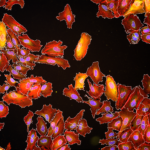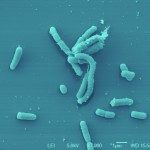Link to Pubmed [PMID] – 16905535
J Biol Chem 2006 Oct; 281(42): 31812-22
Superoxide dismutases (SODs) are enzymes that protect organisms against superoxides and reactive oxygen species (ROS) produced during their active metabolism. ROS are major mediators of phagocytes microbicidal activity. Here we show that the cytoplasmic Listeria monocytogenes MnSOD is phosphorylated on serine and threonine residues and less active when bacteria reach the stationary phase. We also provide evidence that the most active nonphosphorylated form of MnSOD can be secreted via the SecA2 pathway in culture supernatants and in infected cells, where it becomes phosphorylated. A Deltasod deletion mutant is impaired in survival within macrophages and is dramatically attenuated in mice. Together, our results demonstrate that the capacity to counteract ROS is an essential component of L. monocytogenes virulence. This is the first example of a bacterial SOD post-translationally controlled by phosphorylation, suggesting a possible new host innate mechanism to counteract a virulence factor.




